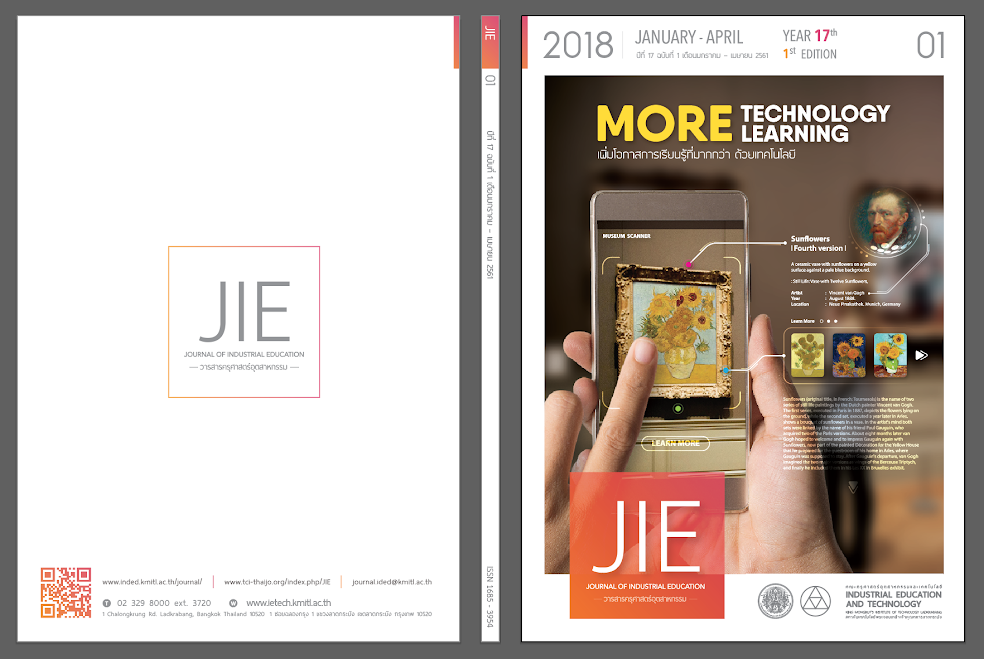A STUDY OF CRITICAL THINKING ABILITY OF MATHAYOMSUKSA III STUDENTS THROUGH INQUIRY-BASED LEARNING ACTIVITIES IN PROBABILITY
Keywords:
Ability, Critical Thinking, Inquiry-Based Learning, ProbabilityAbstract
The purposes of this research were to 1) study students’ critical thinking ability through inquiry-based learning activities in probability, and 2) compare students’ critical thinking ability between the ones who learned probability through inquiry-based learning activities and other students who studied the topic through conventional activities. The subjects selected by a method of quota sampling were Mathayomsuksa III students from Suankularb school in Bangkok, during the second semester of the 2017 academic year. They were divided into two groups. In the first group, forty students were taught probability through inquiry-based learning activities and in the second group, forty students studied the topic through conventional activities.
The instruments used in this research included 1) eleven lesson plans provide students to learn probability through inquiry-based learning and 2) a test on critical thinking ability. Percentage, mean ( ), standard deviation (S.D.), Z-test for Population Proportion and t-test for Independent Samples were employed in
the analysis of data.
The findings revealed that: (1) the number of students who scored since 60% on the critical thinking ability test was more than 60% of the total number of students. The Z-test was analyzed at .05 level of significance; and (2) the t-test showed that the students who were taught probability through inquiry-based learning activities gained significantly in terms of critical thinking ability better than the students who were taught probability through conventional activities at the .01 level.
References
[2] Office of the Basic Education Commission. 2010. National Education Act B.E. 2542 for additional corrective No. 2 B.E. 2545 and No. 3 B.E. 2553. Photocopied.
[3] Chatkhup Sansanee. and Chuchart Ausa. 2001. Fuk samong hai khit yang mi wicharanayan. Bangkok: Wathanapanich.
[4] Ennis. 2015. Critical Thinking: A Streamlined Conception. In Davies, M.; & Barnett, R. The Palgrava Handbook of Critical Thinking in Higher Education. 31-47.New York: Palgrave Macmillan.
[5] Makanong Aumporn. 2016. Thaksa lae krabuankan thang khanittasat: kanphatthana phua phatthanakan. 3rd ed. Bangkok: Chulalongkorn University.
[6] Susoarat Prapansiri. 2013. Kanphatthana kan knit. 5th ed. Bangkok: Technicprinting.
[7] Aizikovitsh, E. ;& Amit M. 2008. Developing Critical Thinking in Probability Session. International Group for the Psychology of Mathematics Education, 2: 9-16.
[8] Shakirova, D.M. 2007. Technology for the Shaping of College Students’ and Upper-Grade Students’ Critical Thinking. Russian Education and Society, 49(9): 42-52.
[9] Munkham Suwith., et al. 2011. Kanchat kitchakam kan rianru thi nen kan khit. Bangkok: EK Books.
[10] Anurutwong Usanee. 2011. Nakwichakan chi dek Thai wikrit thang khwamkhit het chak rebop kansuksa. Manager Online. [Online]. Available: https://www.manager.co.th/Family/ViewNews.aspx?NewsID=9540000024701.
[11] Peter, E. Ebiendele. 2012. Critical thinking: Essence for teaching mathematics and mathematics problem solving skills. African Jorunal of Mathematics and Computer Science Research, 5(3): 39-43.
[12] Siritho Siripak. 2015. Kan khit wicharanayan: mumming kansuksa lae kanborihan chatkan. In Sinlarat, P. Sat kan khit. 71-90. Bangkok: Dhurakij Pundit University.
[13] Sintapanon Sukon. Wanlerdluk Worarat. and Sintapanon Pannee. 2012. Phatthana thaksa kan khit…tam naeo patirup kansuksa. Bangkok: Technicprinting.
[14] Sararattana Wirot. 2013. Krabuan that mai thangkan suksa korani thatsana to kansuksa satawat thi yisipet. Bangkok: Thipayawisut.
[15] Anurutwong Usanee. 2012. High Level of Thinking Skills: How to Develop. Bangkok: Inthanon.
[16] Pechsung Peechanika. 2012. Effects of Organizing Mathematics Learning Activities Using 5E Instructional Model and Open-ended Questions on Mathematical Reasoning Ability and Critical Thinking Ability of Eighth Grade Students. Thesis M.D. (Curriculum and Instruction), Education, Chulalongkorn University.
[17] Khammanee Tidsana. 2012. Sat kanson: ongkhwamru phua kanchat krabuankan rianru thi mi prasitthiphap. 3rd ed. Bangkok: Chulalongkorn University.
[18] Sintapanon Sukon. 2015. Kanchatkan rianru khong khru yuk mai…phua phatthana thaksa khong phu rian nai satawat thi yisip et. Bangkok: Technicprinting.
[19] Promjittipong Orapan. 2013. A Cognitive Analysis of Mathayomsuksa 3 Students’ Mathematical Errors and Misconceptions about Probability. Thesis M.D. (Mathematics Education), Graduate School, Khon Kaen University.
[20] Mulkhum Suwit., et al. 2011. Kanchat kitchakam kan rianru thin en kan khit. Bangkok: E.K. Books.
[21] O’Daffer, Phares G.; & Thornquis, Bruce A. 1993. Critical Thinking, Mathematical Reasoning, and Proof. In Patricia S. Research Ideas for the Classroom High School Mathematics. 39-50. New York: Macmillan.
[22] Aizikovitsh, E.; & Amit M. 2011. Developing the skills of critical and creative thinking by probability teaching. Procedia Siocial and Behavioral Sciences, 15: 1087-1091.
[23] Aizikovitsh, E.; & Cheng D. 2015. Developing Critical Thinking Skills from Dispositions to Abilities: Mathematics Education from Early Childhood to High School. Creative Education, 6: 455-462.
[24] Pittayanan Jatunarapit; Thiyaporn Kantathanawat; and Pariyaporn Tungkunanan. 2016. The Inquiry Learning Model to Develop The Achievement on Conceptual Model of Upper Secondary Princess Chulabhorn’s College Chonburi. Journal of Industrial Education,
15(1): 219-225.
Downloads
Published
How to Cite
Issue
Section
License
"The opinions and contents including the words in papers are responsibility by the authors."
"ข้อคิดเห็น เนื้อหา รวมทั้งการใช้ภาษาในบทความถือเป็นความรับผิดชอบของผู้เขียน"



